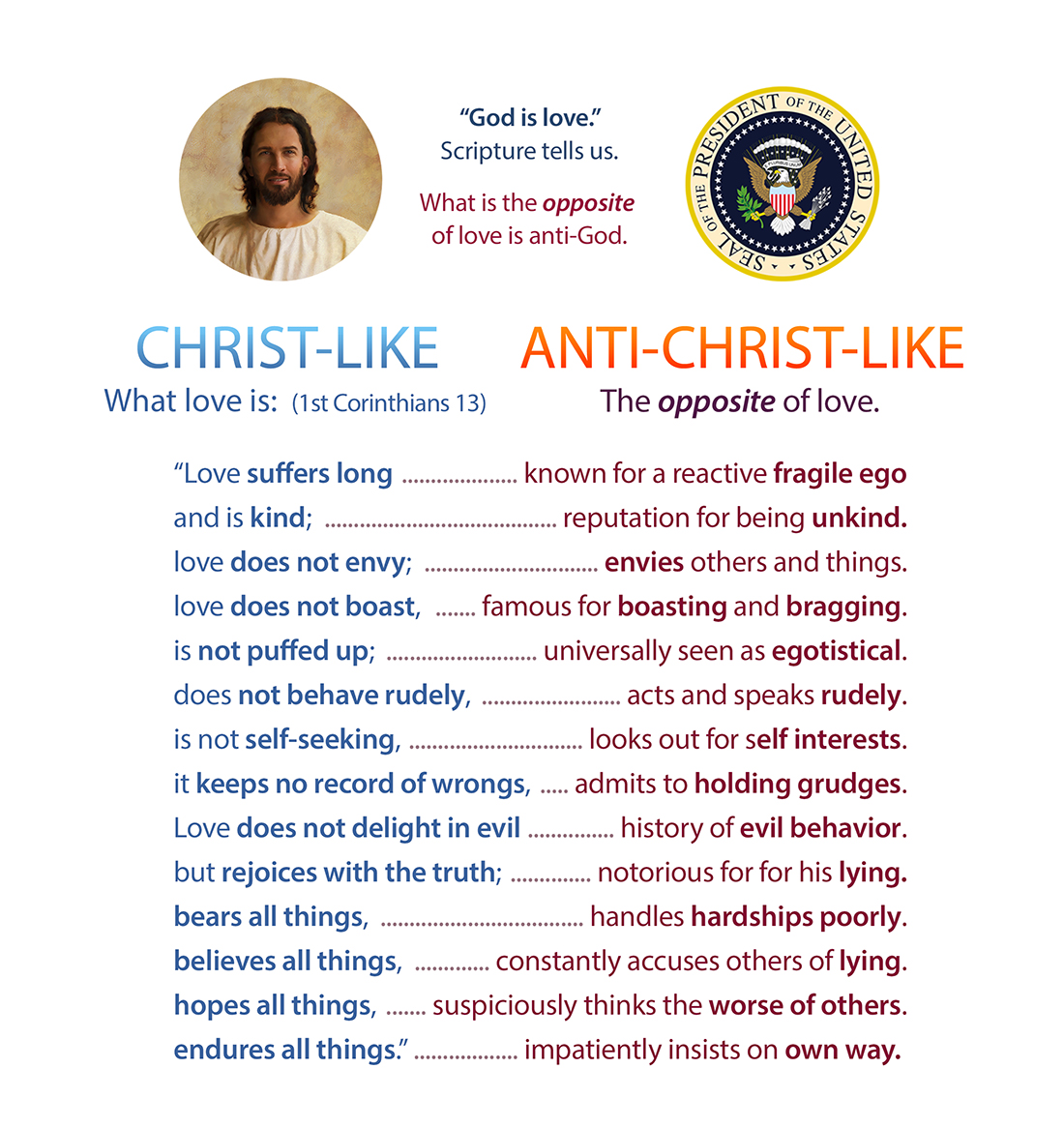The Bible tells us in 1 John 4:8 that “God is love.” Love is not just a feeling but a way of life—one that embodies patience, kindness, humility, and truth. When we stray from love, we embrace its opposite—pride, selfishness, and cruelty.
This image uses 1 Corinthians 13, often referred to as the “love chapter,” to illustrate the stark difference between a Christ-like character and an Anti-Christ-like character. As we evaluate leaders, public figures, and even ourselves, we should consider: Do our actions align with the biblical definition of love, or do they reflect its opposite?
What It Means to Be Christ-Like
The Bible provides a clear definition of love through the words of Paul:
- Love suffers long → It is patient, enduring, and slow to anger.
- Love is kind → It treats others with compassion and care.
- Love does not envy → It celebrates the success of others rather than resenting them.
- Love does not boast → It does not seek attention or glorify itself.
- Love is not puffed up → It is humble and does not act superior to others.
- Love does not behave rudely → It respects and uplifts others.
- Love is not self-seeking → It prioritizes others over personal gain.
- Love keeps no record of wrongs → It forgives rather than holding onto resentment.
- Love does not delight in evil → It rejects corruption and wrongdoing.
- Love rejoices with the truth → It values honesty and integrity.
- Love bears all things → It perseveres through hardship with grace.
- Love believes all things → It trusts and gives others the benefit of the doubt.
- Love hopes all things → It sees the best in people and situations.
- Love endures all things → It does not give up or insist on its own way.
These characteristics define true leadership, one that serves others selflessly and upholds righteousness.
The Opposite: Anti-Christ-Like Traits
On the other hand, Anti-Christ-like traits reflect the absence of love:
- A fragile ego → Reacts with anger and insecurity instead of patience.
- Unkindness → Treats others harshly and without compassion.
- Envy → Resents the success or happiness of others.
- Boasting and bragging → Seeks constant validation and self-promotion.
- Egotistical → Considers oneself superior and disregards others.
- Rudeness → Speaks and acts with disrespect.
- Self-interest → Focuses solely on personal gain rather than the common good.
- Holding grudges → Refuses to forgive, using past wrongs as weapons.
- Evil behavior → Displays a pattern of dishonesty, corruption, and immorality.
- Lying → Uses deceit rather than standing for truth.
- Handling hardships poorly → Blames others instead of showing resilience.
- Constantly accusing others of lying → Distrusts and sows division.
- Suspiciously thinking the worst of others → Fosters paranoia and negativity.
- Insisting on one’s own way → Is impatient, stubborn, and unwilling to compromise.
Applying This to Leadership and Daily Life
Whether in politics, workplaces, or personal relationships, these qualities matter. Leaders who embody Christ-like love build trust, unity, and justice. Those who reflect the Anti-Christ-like traits create division, conflict, and selfish rule.
As voters, we must ask ourselves: Are we choosing leaders who reflect love, or those who embody its opposite? The same applies to our personal lives—are we striving to be patient, kind, and truthful, or do we let pride, envy, and selfishness take over?
The Bible makes it clear: Love is the defining trait of God’s character. Anything that stands against love is anti-God.
What do you think? How do these biblical principles apply to today’s world? Share your thoughts in the comments!

Leave a Reply